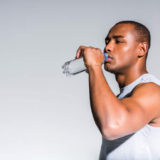During the holiday season, most people worry about putting on extra weight or spending more than their budget allows for. While these are valid concerns, few recognize the stress they put their heart under when including booze in their holiday celebrations.
The physiological consequences of drinking too much alcohol are frequently centered on hangovers and liver damage. However, the heart is just as susceptible to alcohol overindulgence. Named by physicians as “holiday heart syndrome,” the frightening experience of the heart fluttering is a frequent consequence of raucous holiday parties.
What Is Holiday Heart Syndrome?
Rarely known to most partygoers, drinking too much alcohol can cause heart palpitations. Drinking excessive amounts of alcohol leads to what doctors have dubbed “holiday heart syndrome” – an irregular heartbeat experienced by those who overindulge at holiday parties and then end up in the emergency room. According to Ajit Raisinghani, M.D., Director of the UCSD Non-Invasive Cardiac Lab, “Alcohol consumption can cause significant cardiac toxicity.”
While this phenomenon can happen anytime, holiday heart syndrome is seen more often during the holidays and consists of the following:
- A rapid pulse
- An irregular heartbeat
- Palpitations
Sometimes, there are additional symptoms such as:
- Anxiety
- Chest pain
- Difficulty breathing
- Nausea
- Dizziness
- Fainting
- Excessive sweating
About Holiday Heart Arrhythmia
Any disturbance in the normal beating pattern of the heart is called an arrhythmia, or irregular heartbeat. Practically everyone experiences some type of arrhythmia on occasion – usually in the form of a mild palpitation or a sensation of the heart skipping a beat. In actuality, a skipped beat is actually an early beat that is weak followed by a pause and then a forceful beat.
The most common abnormal cardiac rhythm that occurs with holiday heart syndrome is atrial fibrillation. Although several factors appear to contribute to holiday heart, the most likely reason is related to the metabolization of alcohol. When alcohol is metabolized by the body, it breaks down into acetaldehyde – a compound that can cause a delay in the heart’s conduction system. In fact, studies done in the U.S. have shown that 35 percent of new onset atrial fibrillation cases are related to alcohol abuse.
What You Should Know
Holiday heart syndrome is not usually life threatening and its symptoms are typically transient. The heart will often revert back to a normal rhythm within 24 hours of abstaining from alcohol. Nonetheless, it is important to recognize that heavy drinking over a period of time can lead to irreversible heart damage. In addition, some individuals require anti-arrhythmic drugs or cardioversion to get their heart back into a healthy rhythm.
According to Vera Bittner, M.D., associate professor of medicine at the University of Alabama School of Medicine in Birmingham, you should see a doctor if your heart seems to skip a beat more often than just momentarily – or once in a while. In addition, medical attention is advised if you feel heart palpitations and:
- Feel as though you will pass out
- Have swollen ankles or shortness of breath
- Have any form of heart disease
- Have chest pain or pressure
- Are light-headed and nauseated
A Better Plan
Because no one wants to ruin their holiday celebrations with holiday heart syndrome, experts advise limiting alcohol intake to just one or two drinks per day. Some additional strategies to prevent palpitations include:
- Breathe Deeply – Some palpitations are caused by anxiety. Taking a deep breath and exhaling slowly helps to relieve tension and discourage future chest flutters.
- Physical Activity – Since your heart is a muscle, inactivity can cause it to be out of shape. Regular, cardiovascular activity (like running, walking briskly, swimming, gardening or dancing) can help get your heart in peak condition.
- Skip Caffeine – An ingredient in coffee, tea and chocolate, caffeine has a stimulating effect that can cause a rapid heartbeat and bring on palpitations. For an extra boost of energy, consider taking a natural approach with NT Factor – a substance that nourishes the energy centers of your cells.
- Don’t Smoke – Although this may be easier said than done for an addict, nicotine and other chemicals in cigarette smoke can constrict arteries and encourage heart palpitations.
In addition, the following suggestions may help break an episode of tachycardia (a rapid heartbeat). For safety reasons, always consult with your physician before trying any of these techniques:
- Carotid Pressure – Gentle pressure to the prominent carotid artery on the right side of the neck may help break an attack of tachycardia.
- Vagal Maneuver – Applicable only to atrial arrhythmias, sit down, bend forward at the waist, hold your breath and strain as if blowing up a balloon. This switches control from the sympathetic nervous system to the parasympathetic nervous system, which slows down bodily functions.
- Cold Face Splash – Plunging your face into a basin of cold water will temporarily cause your heart rate to drop – a change that can break an episode of tachycardia.
The best way to enjoy your holidays is to be smart when partying. It’s just not worth it to load up on alcohol during your celebrations. As anyone who has ever gone through it can attest, holiday heart syndrome is a perfect way to ruin holiday cheer. Gambling with your heart’s health is a serious matter and a foolish move upon realizing that holiday heart syndrome is a completely avoidable phenomenon.




